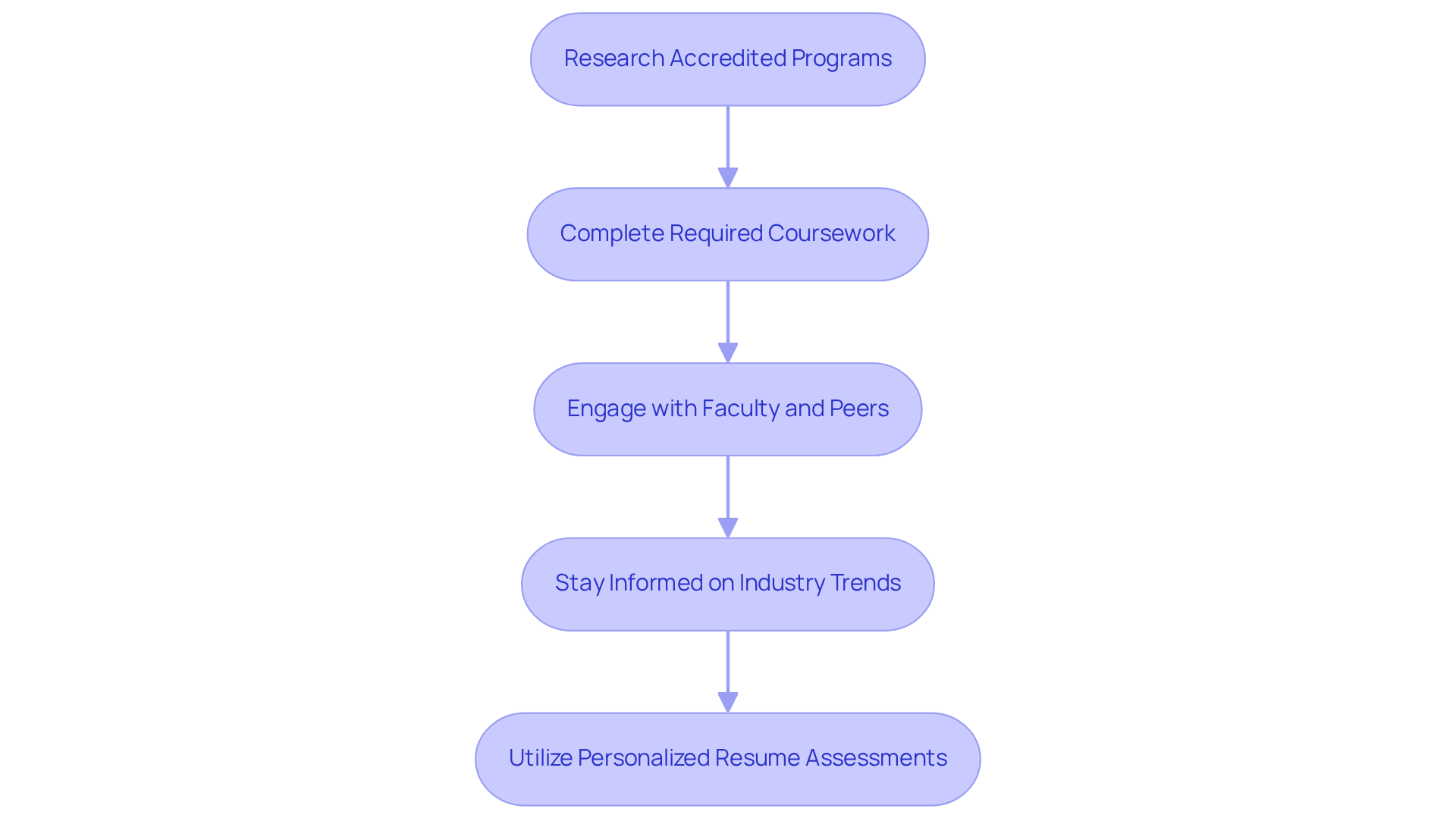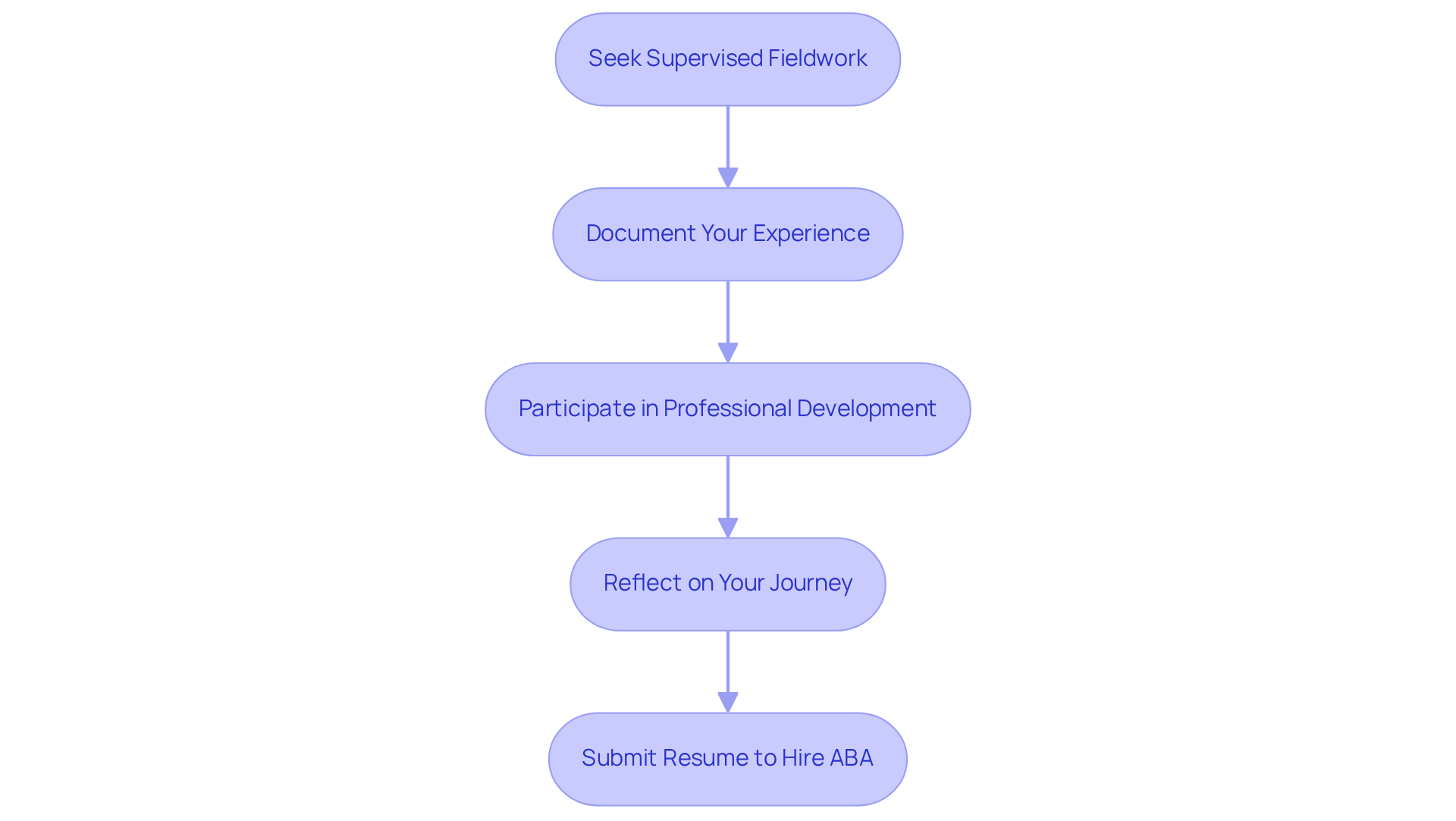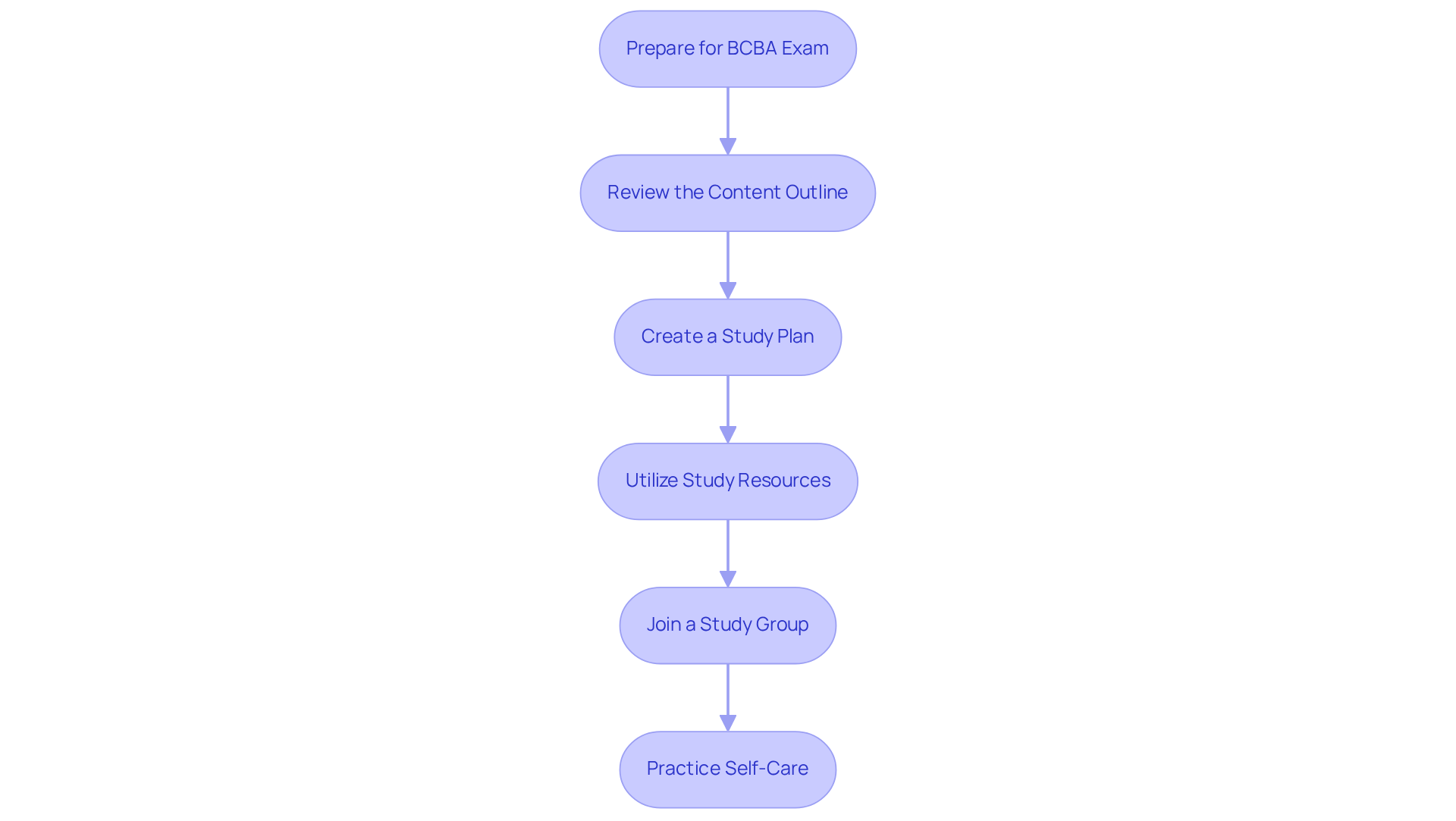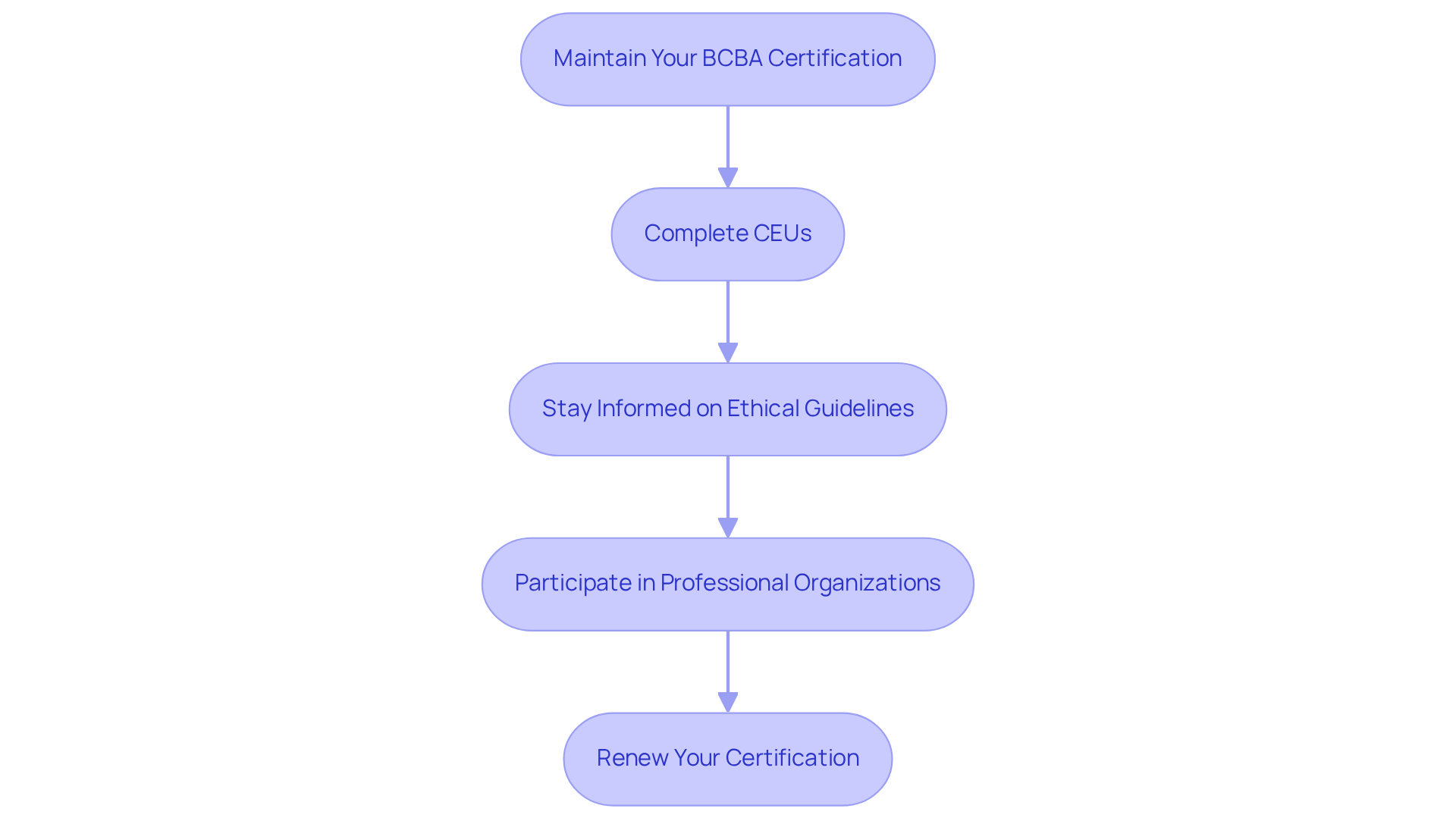October 21, 2025

To become a Board Certified Behavior Analyst (BCBA), one must navigate a structured path. This journey begins with earning a relevant graduate degree, which lays the foundation for expertise in the field. Next, gaining practical experience in Applied Behavior Analysis (ABA) is crucial, as it equips candidates with the hands-on skills necessary for effective practice. Preparing for and passing the BCBA exam is a significant milestone, underscoring the importance of thorough study strategies. Finally, maintaining certification through ongoing professional development ensures that BCBAs remain current in their knowledge and practices.
Why is this important? The demand for BCBAs is on the rise, making it essential for aspiring professionals to follow these steps meticulously. Accredited programs and supervised fieldwork play a pivotal role in this journey, enabling candidates to build a robust skill set. Are you currently facing challenges in hiring qualified BCBAs? Consider how utilizing platforms like Hire ABA can streamline your recruitment process and connect you with top talent.
In summary, the path to becoming a BCBA is clear and structured. By adhering to these guidelines, candidates can ensure their success and contribute significantly to the field of behavior analysis.
The journey to becoming a Board Certified Behavior Analyst (BCBA) is not only rewarding but also demanding, reflecting the increasing demand for skilled professionals in the field of Applied Behavior Analysis (ABA). Did you know that the need for BCBAs has surged in recent years? This guide outlines the essential steps aspiring BCBAs must take, from obtaining a relevant graduate degree to passing the certification exam and maintaining credentials. As you navigate these requirements, consider: what strategies will ensure your success in this competitive landscape? By leveraging effective recruitment solutions like Hire ABA, you can streamline your path to becoming a BCBA and address the pressing challenges in hiring qualified professionals.
To embark on your journey toward becoming a BCBA, the first step is obtaining a relevant graduate degree. Typically, this involves earning a Master's degree in Applied Behavior Analysis, Psychology, or a related field as a prerequisite for becoming a BCBA. The following steps will guide you:
After earning your degree, consider utilizing personalized resume assessments offered by Hire ABA. By submitting your resume, our team will evaluate your background and career objectives, ensuring you are matched with the most suitable positions in ABA therapy. Our advanced job fit scoring will help identify opportunities that align with your skills, preferences, and desired locations, optimizing your job search and career trajectory.
Are you ready to take the next step in your career? With the right support from Hire ABA, you can navigate the path to success in the ABA field.

In today's rapidly evolving landscape, the demand for professionals pursuing becoming a BCBA is at an all-time high. After obtaining your graduate degree, the next step in becoming a BCBA is to acquire practical knowledge in Applied Behavior Analysis. This experience is vital for becoming a BCBA, as it helps in developing your skills and understanding the nuances of the field. At Hire ABA, we simplify the job matching process to assist you in finding your perfect behavior analyst position. Follow these essential steps:
Once you have completed your practical training, submit your resume to Hire ABA. Our team will evaluate your background and career aspirations to connect you with positions that align with your skills, objectives, and work-life harmony. Are you ready to take the next step in your career? Let Hire ABA guide you to success.

Once you have completed your education and gained practical experience, the critical next step is to prepare for and excel in the certification test. The soaring demand for Board Certified Behavior Analysts (BCBAs) highlights the importance of becoming a BCBA for your career advancement. Here’s how to effectively prepare:
Reflect on your current study strategies. Are they effective in addressing your preparation challenges? With these steps, you are not just preparing for a test; you are investing in your future by becoming a BCBA.

After successfully passing the BCBA exam and obtaining your certification, becoming a BCBA requires you to maintain your credentials. The rising demand for BCBAs makes becoming a BCBA essential to remain certified. Here are the steps to ensure you stay on track:
By taking these steps towards becoming a BCBA, you not only maintain your certification but also enhance your professional standing in the field.

Embarking on the journey to become a Board Certified Behavior Analyst (BCBA) is a significant commitment that requires careful planning and execution. Did you know that the demand for BCBAs is at an all-time high? This article outlines a clear four-step process:
Each of these steps is crucial in building a solid foundation for a successful career in Applied Behavior Analysis.
Key insights include the importance of:
Furthermore, maintaining your certification through continuing education and active participation in professional organizations ensures ongoing growth and adherence to ethical standards in the field.
Ultimately, the path to becoming a BCBA is not just about meeting requirements; it is about embracing a lifelong journey of learning and professional development. By following these steps and leveraging resources like Hire ABA, aspiring BCBAs can position themselves for success in a rewarding and impactful career. Are you ready to take the initiative today to invest in your future and contribute to the advancement of behavior analysis?
What is the first step to becoming a BCBA?
The first step to becoming a BCBA is obtaining a relevant graduate degree, typically a Master's degree in Applied Behavior Analysis, Psychology, or a related field.
How can I find a suitable graduate program for BCBA?
Look for programs accredited by the Association for Behavior Analysis International (ABAI) or the Behavior Analyst Certification Board (BACB) to ensure the curriculum meets necessary standards.
What coursework is required in a graduate program for BCBA?
Required coursework should cover essential topics such as behavior assessment, intervention strategies, ethics, and research methods, and must include supervised fieldwork.
Why is networking important during my graduate studies?
Networking with faculty and peers can deepen your understanding of the field and provide valuable insights through discussions and collaborative projects.
How can I stay updated on industry trends in ABA?
Stay informed by reading relevant journals, attending webinars, and participating in workshops to keep up with the latest research and practices in Applied Behavior Analysis.
What services does Hire ABA offer after earning my degree?
Hire ABA offers personalized resume assessments, evaluating your background and career objectives to match you with suitable positions in ABA therapy.
How does Hire ABA help with job searching?
Hire ABA uses advanced job fit scoring to identify opportunities that align with your skills, preferences, and desired locations, optimizing your job search and career trajectory.
Our expert recruitment strategies and AI-driven sourcing ensure that you receive top-notch candidates quickly, without compromising on quality. Whether you’re looking for BCBAs, Clinical Directors, or RBTs, we’ve got you covered.